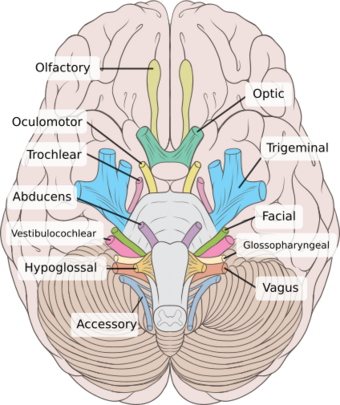Medicine:Jugular foramen syndrome
From HandWiki
| Jugular foramen syndrome | |
|---|---|
 | |
| Human brain inferior view showing cranial nerves |
Jugular foramen syndrome, or Vernet's syndrome, is characterized by paresis of the glossopharyngeal, vagal, and accessory (with or without the hypoglossal) nerves.[1][2]
Symptoms
Symptoms of this syndrome are consequences of this paresis. As such, an affected patient may show:[citation needed]
- dysphonia/hoarseness
- soft palate dropping
- deviation of the uvula towards the normal side
- dysphagia
- loss of sensory function from the posterior 1/3 of the tongue (CN IX)
- decrease in the parotid gland secretion (CN IX)
- loss of gag reflex
- sternocleidomastoid and trapezius muscles paresis (CN XI)
Causes
- Glomus tumors (most frequently)
- Meningiomas
- Schwannomas (Acoustic neuroma)
- Metastatic tumors located at the cerebellopontine angle
- Trauma
- Fracture of occipital bone
- Infections
- Cholesteatoma (very rare)
- Obstruction of the jugular foramen due to bone diseases
- Nasopharyngeal carcinoma spreading into the parapharyngeal space involving the ninth, tenth, and eleventh cranial nerves
Diagnosis
- Gadolinium enhanced mri for vestibular schwannoma
- mri and biopsy for nasopharyngeal carcinoma
- based on nerve palsies
- NCCT for occipital bone fracture
References
- ↑ Erol FS, Kaplan M, Kavakli A, Ozveren MF.Jugular foramen syndrome caused by choleastatoma. Clin Neurol Neurosurg. 2005 Jun;107(4):342-6.
- ↑ Schmidek and Sweet Indications, Methods and Results (Expert Consult - Online and Print) (6th ed.). London: Elsevier Health Sciences. 2012. p. 2337. ISBN 9781455723287.
 |

